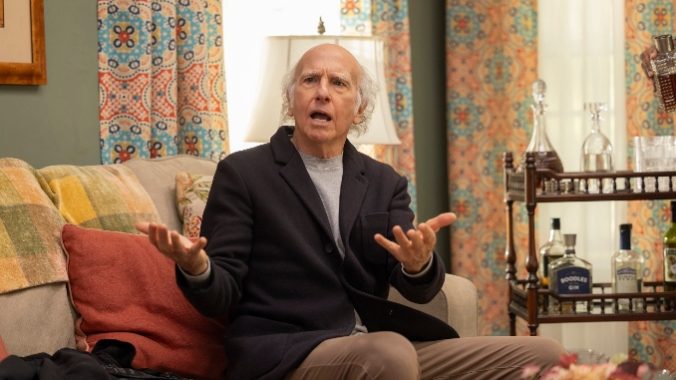Goodbye to All That: Curb Your Enthusiasm‘s Final Season
Photo by John Johnson / HBO
During Curb Your Enthusiasm’s decades-long run, we’ve seen Larry David lampoon himself for the sake of our laughter. Dick jokes, secondhand embarrassment, and an expert deployment of double entendres have remained a staple of his unique brand of comedy. As he’s gotten older, David has continued to chart the events of his life by infusing humor into his personal stories, and the series finale of his beloved hit show is no different.
Prostate problems, pointless social obligations, and relationship troubles only further plague David’s fictitious version of himself, especially in his advanced age. From the bedroom to the driving range, we agonize alongside Larry in his woes. We pick up where we last left off in Larry’s romantic life with the highly insufferable Irma Kostroski (Tracey Ullman); she’s a nightmare of a woman. I could’ve done without every minute of her screen time, which is, of course, the point. David’s dynamic with Ullman is like nails on a chalkboard, and her character is the perfect backdrop to accentuate his outlandish reactions at their absolute highest. His disgust only grows from the previous season, which leaves the audience, in David’s expert way, to, if not condone his behaviors and choices, at least understand them. At best (or is it at worst?), we can relate to him. The two-time Emmy award winner is nothing short of masterful in his ability to find the loophole in impropriety and skirt the norms of polite society.
This season boasts an impressive list of cameo appearances, as well as familiar faces from its supreme cast of recurring characters such as Cheryl Hines, who plays Larry’s ex-wife, Jeff Garlin and Susie Essman, J.B. Smoove as the inimitable Leon Black, plus Richard Lewis and Ted Danson as themselves. In Episode 6, Larry pisses Ted off in one particular scene that’s cause for critical acclaim. Larry’s dynamic with his on-screen best friend and manager Jeff Greene (Garlin) is at its all time high; their energy is electric, palpable, and hilarious. Their antics are no more ridiculous than what we’ve seen in previous seasons, but their fleeting time together leaves us with a pretty, pretty, pretty precious depiction of male friendship at its finest.
-

-

-

-

-

-

-

-

-

-

-

-

-

-

-

-

-

-

-

-

-

-

-

-

-

-

-

-

-

-

-

-

-

-

-

-

-

-

-

-








































